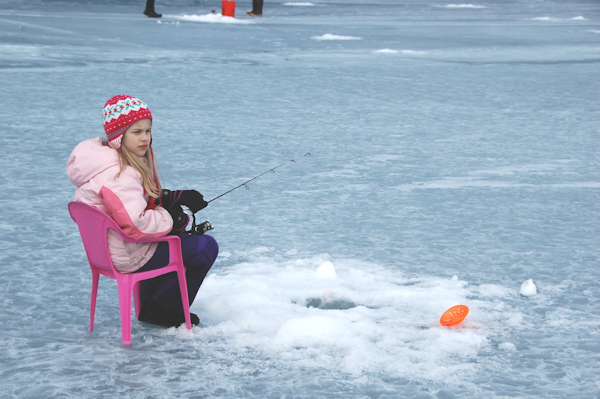SEJournal Online is the digital news magazine of the Society of Environmental Journalists. Learn more about SEJournal Online, including submission, subscription and advertising information.
 |
 |
| Family ice fishing day at Silver Lake in Alaska. Photo: Bureau of Land Management/Nora Berner, via Flickr Creative Commons (CC BY 2.0 DEED). |
TipSheet: How Ice Fishing Can Break the Ice on Your Local Climate Story
By Joseph A. Davis
Breaking: A car fell through the ice into a lake. It’s still winter. There’s your local climate story.
Ice fishing is fun, and in much of the northern half of the United States, it’s a community event, a tourist attraction, an industry, a form of psychotherapy, an escape and a tradition.
Safety is key, of course, and that usually means ice that is thick enough for the fun. That, in turn, means cold temperatures over a longish time.
So, under the influence (perhaps of schnapps), some communities traditionally tow an old car out onto the lake ice and take bets or sell raffle tickets on the exact date and time it will fall through. Not only is it a hoot, but it helps warn about and advertise the safety of the ice.
So it was actually news when the car fell through the lake ice in Okoboji, Iowa, this year on the morning of Feb. 8. — “Earlier Than Ever Before,” according to news station KIWA-FM.
For all you environmental journalists, it is good to know that the Iowa Great Lakes Rotary Club, which sponsors the raffle and raises funds from it, removed the oil and other pollution hazards from the wreck before placing it on the ice. No tanks, no engine, no seats, no electronics.
But the Rotary had planted a clock in the car, which divers and tow trucks later pulled from the lake. It recorded the sinking at 9:30 a.m.
Why it matters
Other communities do something similar. And while TipSheet has doubts that the data about car drop dates has enough integrity (or a long enough time series) to be of huge value to climate scientists, it certainly helps the climate change story hit home.
By now, you’ve probably guessed why it matters: because climate heating matters increasingly as it disrupts life across the planet. Not to mention agriculture in the Midwest and other parts of the United States.
A lot of people don’t think
climate heating is happening yet
and don’t think it is important.
It also matters because a lot of people in the United States don’t think it is happening yet and don’t think it is important. And because if people understand the immediacy of the threat, they are likelier to do something to reduce it.
Story ideas
- Find popular ice-fishing lakes near you. Go there and check out the scene. Talk to people, including those out on the ice. What are they catching? Ask whether it’s a family tradition — were they introduced to ice fishing by parents, grandparents or older relatives?
- What do the ice fishers in your area think about the effect of global heating on their sport?
- Find local bait shops and other stores near the ice-fishing site. Talk to someone who has been around for a while. Ask about the history of the ice-fishing scene over the years. Ask when the ice melts and whether the timing has changed.
- Ask the bait store to hook you up with any available ice-fishing guides (yes, they exist). Talk to the guides about what they do — and when they do it.
- What sort of licensing requirements does your state fisheries management agency impose on ice fishing? (See the agency list below.) Is there a legal season? What are the catch limits? Talk to experienced people at the agency. Talk to local game wardens.
- Have there been any incidents of people driving cars onto the ice and having them fall through unintentionally? Ask why.
- Are there any fish consumption advisories for the water body you are interested in? Do people heed them?
Reporting resources
- Association of Fish & Wildlife Agencies: Its membership list includes agencies for all states, tribes, etc.
- American Sportfishing Association: A membership association for sport fishers.
- USA Ice Team: Yes, ice fishing is an international competitive sport. These people are serious about it.
- Western Ice Fishing Association: The Facebook page for this fishers group.
- Women on Ice: The Women Ice Angler Project is an affinity group for women ice fishers.
[Editor’s Note: For more on this topic, check out TipSheets on seasonal fishing stories, the use of lead tackle, fishing advisories and the expansion of fishing at national refuges. Also, see Toolboxes on trout streams and climate change and consumption advisories. Plus, track EJToday headlines and other info on fish and fisheries.]
Joseph A. Davis is a freelance writer/editor in Washington, D.C. who has been writing about the environment since 1976. He writes SEJournal Online's TipSheet, Reporter's Toolbox and Issue Backgrounder, and curates SEJ's weekday news headlines service EJToday and @EJTodayNews. Davis also directs SEJ's Freedom of Information Project and writes the WatchDog opinion column.
* From the weekly news magazine SEJournal Online, Vol. 9, No. 10. Content from each new issue of SEJournal Online is available to the public via the SEJournal Online main page. Subscribe to the e-newsletter here. And see past issues of the SEJournal archived here.










 Advertisement
Advertisement 


